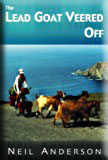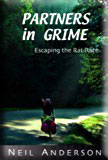
|
Fried Green Tomatoes
Rock and roll! We were definitely on a roll for choosing rocky roads. In the morning, we left our bunker camping area and followed a sand road. The road eventually got better - it turned to gravel. Then, farther on, the surface became littered with sharp rocks. I wished I had a mountain bike! We laboured five long uphill kilometers, our rear tires losing traction, slipping on the steep sections of loose scree. By mid-morning the sun beat down relentlessly; I was soaked from the exertion. As I powered along uphill at a barely moving four-kilometers-per-hour clip, the thought crossed my mind that I was never going to reach the top. But eventually I did - knees throbbing and right eye squeezed shut in an effort to thwart the stinging sweat that streamed down my forehead. Even the vision in my one open eye was bleary. I reached the summit and celebrated my achievement with a weak cheer. Perhaps I should have waited. Where the uphill had been knee-wrenching, the downhill was wrist-breaking. As I jarred my way down, bouncing from rut to rut in a near out of control descent, I began to think the uphill had been a delight in comparison. My brakes were crammed on as tightly as I could squeeze the levers and still I rolled faster than I wanted to. With gritted teeth, I hung onto my mount as if it were a team of runaway horses. Finally, my hands totally cramped, bent and stiff like a pair of lobster claws, I rejoined the pavement and breathed a sigh of relief. "Good thing I put new brakes on this puppy!" I remarked wryly. The road into Gonnesa was in better shape. It was even paved! After our morning's ride, I definitely had a new-found appreciation for asphalt (and so did my bum!). In Gonnesa, I went into a small owner-run grocery shop and pointed out two tomatoes to the attentive shopkeeper that I wished to buy. He was dismayed with my selection. "Old," he said, shaking his head. I pointed to the two ripe tomatoes a second time. He protested again, but gingerly picked them up and gently placed them into a paper bag for me. I smiled. He smiled. Then he stooped and grabbed a large green tomato from an adjacent box. "No charge," he said as he added it to my two "old" ones. The "new" tomatoes were a thousand lire more per kilo than the old red ones. The shopkeeper must have thought I was choosing the red ones because I couldn't afford the others. I thanked him for his generosity while wondering how long it would take to ripen a tomato that was as hard as a baseball. Our ride to Fontanamare was on good roads. "I could get used to this," I said, pleased that my bottom had stopped smarting. In Fontanamare, Sharon spotted a motorcycle shop and stopped. She had become insistent about getting a new patch kit. We hadn't had a flat in so long she was worried our already-opened glue would be dried-up when we needed it. She was probably right. Straddling my bike curbside, I rummaged in my pocket, and pulled out a ten-thousand lire note. "Harumph!" Sharon snorted rather grumpily when she realized she was expected to go into the shop. (Until then, I had gone into every store and dealt with the often frustrating language barrier.) So, this would be her solo virgin debut and you know we're all a little nervous our first time. She snatched the money and stomped off. With my usual uncanny perception, I could tell she was ill-at-ease about going into the shop. I hoped they would be gentle. I needn't have worried. Sharon returned with a big smile plastered across her face. "They were so helpful," she bubbled, and related the details of her premier encounter. "They didn't understand 'patch kit,' so I went 'Shhh' while pointing to a tire and they gave me this!" she said proudly holding up a made-in-Taiwan patch kit. "It's interesting that they didn't understand 'patch kit,'" I said as I noted the words patch kit emblazoned on the pack in bold red letters. Opening it, I found the enclosed instructions in English only! Sharon took the patch kit and placed it in her handlebar bag. It was like insurance: good to have, but I hoped we never needed to use it. (I could dream couldn't I?) Sometimes buying a patch kit was good karma to ward off flat tires. And, other times, it seemed a curse for attracting flats - as if it just couldn't wait to have its new glue ripped open. I hoped this was the former good-karma type. We must have been living right, because we made it to the next town, Buggerru (gotta love that name), without a single flat, and happily continued to Portixeddu, where we pulled to a stop alongside a phone booth, and scanned the area for a water tap. (Spigots were often located near town center.) A teenaged girl exited the phone booth. Before I could ask her where we could get water, she blurted out in perfect English: "What time is it?" I glanced at my watch. "Ten past five." "Do you know where we can get water?" Sharon asked. Her utterance completely stumped our young English aficionado. The girl shrugged and admitted she didn't understand. "Quelle heure est-il?'' Sharon joked after the girl departed. "They must teach English here the same way they taught us French back home." "Yeah," I answered. "I always wondered why they taught us to ask what time it was when all I had to do was look at my watch. I guess she was just checking to see if it worked." "I wonder if she understood your reply?" We pedalled down a street on the lookout for water. A woman was out on her verandah, watering plants; we pulled over and asked if she could fill our water bottles. Without hesitating, she scooped our containers and hustled into the house. A minute later, cool droplets clinging to the blue plastic like fat morning dew, she handed the full bottles back. "Would you like some orange juice to drink?" she asked in Italian. At least that was what I surmised she had said. I understood the words 'drink' and 'orange.' I accepted. She dashed back inside, and returned with teeny thimble-sized glasses and a bottle of Orange Stock liqueur. Carefully, she poured a thimbleful each. "Made in Italy," she proclaimed. "Strong, but good!" I took a sip. She was right. It was strong. But it was good. While savouring our drink, the woman's daughter, who was taking English lessons in school, tried to converse with us. We had little success, but we left with a warm feeling - both from the liqueur and their impromptu hospitality. Leaving Portixeddu we spied a sign for a dead-end road and followed it. (Dead-ends were often good for camping. Once the locals were home from work, traffic virtually ceased.) We climbed to a pull-off overlooking Portixeddu's already twinkling town lights. It would have been perfect if it hadn't been for the garbage and fluttering strips of brown-stained paper clinging to surrounding bushes. "Obviously," Sharon said, "the view is too good and the access too easy." That was indeed the problem. Everyone came for the pristine view, but few cleaned up after themselves. Why couldn't they be more considerate? However, once inside the tent, we dozed off quickly. All was peaceful till the wee hours of the morning. Then, I heard something outside our tent. It came nearer, gravel crunching underfoot with each step. Suddenly, there was a tug on our rain fly. Sharon sat up and peered out. "There's a goat trying to eat our tent!" she reported, and shooed it away. The rest of the night passed without interruption. |

